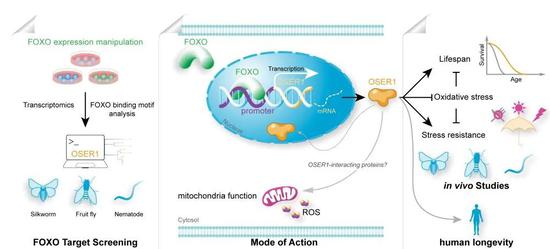
Mechanism of action of OSER1 in lifespan regulation. (Image provided by Southwest University)
Chinese scientists have discovered a new gene, OSER1, that regulates lifespan. This breakthrough provides a novel scientific basis for the study of extending human lifespans.
The team studied the mechanism of action in various species such as silkworms, nematodes, and fruit flies. As a target gene of the longevity gene FOXO, OSER1's impact on lifespan has been supported by human subject research results.
This breakthrough finding was made by Dai Fangyin’s team from the National Key Laboratory of Efficient Utilization of Insect Resources at Southwest University and scientists from abroad. The results have been published in the international academic journal "Nature Communications."
FOXO is one of the few confirmed human longevity genes. It affects lifespan by regulating pathways related to aging, but the targets mediating these effects are largely unknown.
The research team conducted interference experiments on 42 potential direct target genes of the FOXO gene in silkworms, which are similar to genes in nematodes. They discovered that down-regulating the expression of 7 genes significantly shortened the lifespan of nematodes, while down-regulating 3 genes extended their lifespan. Crucially, gene OSER1 had the most significant impact on lifespan when its expression was reduced.
“OSER1 is present in the genomes of various species including nematodes, silkworms, fruit flies, zebrafish, African clawed frogs, mice, rhesus monkeys, and humans,” said Song Jiangbo from National Key Laboratory of Efficient Utilization of Insect Resource at Southwest University, who is also a co-author of the paper.
The study revealed that increasing the expression of OSER1 in silkworms, nematodes, and fruit flies led to a significant extension of their lifespan. This discovery could have implications for understanding the aging process and potentially developing interventions to increase lifespan in other species, including humans.
Research findings on human subjects have confirmed that OSER1 plays a role in determining the human lifespan, according to Song. The study revealed that individuals over 90 years old had 49 common single nucleotide variations in the OSER1 gene, with seven of them showing a significant link to longevity when compared to a younger control group.


















































 京公網安備 11010202009201號
京公網安備 11010202009201號